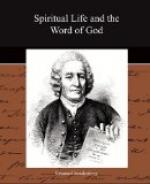The first commandment, “Thou shalt not worship other gods,” includes not loving self and the world; for he that loves self and the world above all things worships other gods; for everyone’s god is that which he loves above all things.
The second commandment, “Thou shalt not profane the name of God,” includes not to despise the Word and doctrine from the Word, and thus the church, and not to reject these from the heart, for these are God’s “name.”
The fifth commandment, “Thou shalt not steal,” included the shunning of frauds and unlawful gains, for these also are thefts.
The sixth commandment, “Thou shalt not commit adultery,” includes having delight in adulteries and having no delight in marriages, and in particular cherishing filthy thoughts respecting such things as pertain to marriage, for these are adulteries.
The seventh commandment, “Thou shalt not kill,” includes not hating the neighbor nor loving revenge; for hatred and revenge breathe murder.
The eighth commandment, “Thou shalt not bear false witness,” includes not to lie and blaspheme; for lies and blasphemies are false testimonies.
The ninth commandment, “Thou shalt not covet thy neighbor’s house,” includes not wishing to possess or to divert to oneself the goods of others against their will.
The tenth commandment, “Thou shalt not covet thy neighbor’s wife, his man-servants,” and so on, includes not wishing to rule over others and to subject them to oneself, for the things here enumerated mean the things that are man’s own. Anyone can see that these eight commandments relate to evils that must be shunned, and not to goods that must be done. (A.E., n. 935.)
But many, I know, think in their heart that no one can of himself shun these evils enumerated in the Decalogue, because man is born in sins and has therefore no power of himself to shun them. But let such know that anyone who thinks in his heart that there is a God, that the Lord is the God of heaven and earth, that the Word is from Him, and is therefore holy, that there is a heaven and a hell, and that there is a life after death, has the ability to shun these evils. But he who despises these truths and casts them out of his mind, and still more he who denies them, is not able. For how can one who never thinks about God think that anything is a sin against God? And how can one who never thinks about heaven, hell, and the life after death, shun evils as sins? Such a man does not know what sin is.
Man is placed in the middle between heaven and hell. Out of heaven goods unceasingly flow in, and out of hell evils unceasingly flow in; and as man is between he has freedom to think what is good or to think what is evil. This freedom the Lord never takes away from anyone, for it belongs to his life, and is the means of his reformation. So far, therefore, as man from this freedom has the thought and desire to shun evils because they are sins, and prays to the Lord for help, so far does the Lord take them away and give man the ability to refrain from them as if of himself, and then to shun them.




